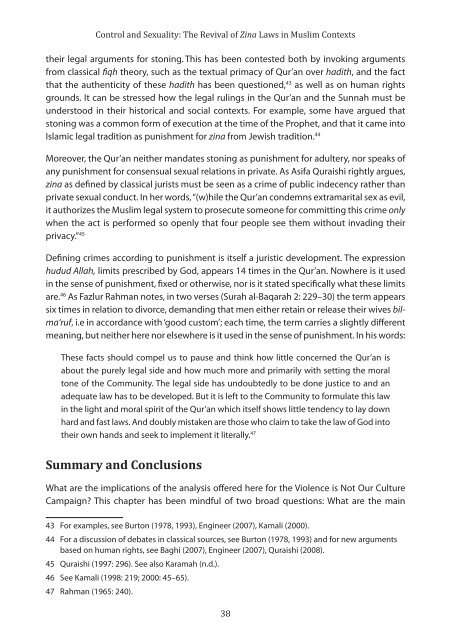control and sexuality
control and sexuality
control and sexuality
- No tags were found...
You also want an ePaper? Increase the reach of your titles
YUMPU automatically turns print PDFs into web optimized ePapers that Google loves.
Control <strong>and</strong> Sexuality: The Revival of Zina Laws in Muslim Contextstheir legal arguments for stoning. This has been contested both by invoking argumentsfrom classical fiqh theory, such as the textual primacy of Qur’an over hadith, <strong>and</strong> the factthat the authenticity of these hadith has been questioned, 43 as well as on human rightsgrounds. It can be stressed how the legal rulings in the Qur’an <strong>and</strong> the Sunnah must beunderstood in their historical <strong>and</strong> social contexts. For example, some have argued thatstoning was a common form of execution at the time of the Prophet, <strong>and</strong> that it came intoIslamic legal tradition as punishment for zina from Jewish tradition. 44Moreover, the Qur’an neither m<strong>and</strong>ates stoning as punishment for adultery, nor speaks ofany punishment for consensual sexual relations in private. As Asifa Quraishi rightly argues,zina as defined by classical jurists must be seen as a crime of public indecency rather thanprivate sexual conduct. In her words, “(w)hile the Qur’an condemns extramarital sex as evil,it authorizes the Muslim legal system to prosecute someone for committing this crime onlywhen the act is performed so openly that four people see them without invading theirprivacy.” 45Defining crimes according to punishment is itself a juristic development. The expressionhudud Allah, limits prescribed by God, appears 14 times in the Qur’an. Nowhere is it usedin the sense of punishment, fixed or otherwise, nor is it stated specifically what these limitsare. 46 As Fazlur Rahman notes, in two verses (Surah al-Baqarah 2: 229–30) the term appearssix times in relation to divorce, dem<strong>and</strong>ing that men either retain or release their wives bilma‘ruf,i.e in accordance with ‘good custom’; each time, the term carries a slightly differentmeaning, but neither here nor elsewhere is it used in the sense of punishment. In his words:These facts should compel us to pause <strong>and</strong> think how little concerned the Qur’an isabout the purely legal side <strong>and</strong> how much more <strong>and</strong> primarily with setting the moraltone of the Community. The legal side has undoubtedly to be done justice to <strong>and</strong> anadequate law has to be developed. But it is left to the Community to formulate this lawin the light <strong>and</strong> moral spirit of the Qur’an which itself shows little tendency to lay downhard <strong>and</strong> fast laws. And doubly mistaken are those who claim to take the law of God intotheir own h<strong>and</strong>s <strong>and</strong> seek to implement it literally. 47Summary <strong>and</strong> ConclusionsWhat are the implications of the analysis offered here for the Violence is Not Our CultureCampaign? This chapter has been mindful of two broad questions: What are the main43 For examples, see Burton (1978, 1993), Engineer (2007), Kamali (2000).44 For a discussion of debates in classical sources, see Burton (1978, 1993) <strong>and</strong> for new argumentsbased on human rights, see Baghi (2007), Engineer (2007), Quraishi (2008).45 Quraishi (1997: 296). See also Karamah (n.d.).46 See Kamali (1998: 219; 2000: 45–65).47 Rahman (1965: 240).38


